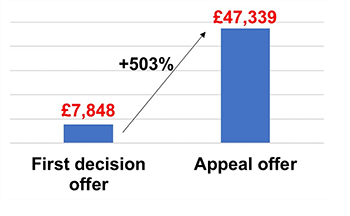APIL data reinforce PI team's concerns claimants treated unfairly by MIB and CICA
Lawyers in the PI team have previously spoken to the press about problems with the handling of serious injury claims by two bodies specifically tasked with supporting people injured through no fault of their own.

Now, the Association of Personal Injury Lawyers (APIL) has released statistics that echo our concerns about claims run by the Motor Insurers Bureau (MIB) and the Criminal Injuries Compensation Authority (CICA).
The Criminal Injuries Compensation Authority is the government agency that oversees compensation for victims of violent crime, which includes for example someone attacked in the street or injured in a terrorist attack.
What the Fieldfisher team has long been concerned with is that CICA appears to reject claims or offer low value settlement on the assumption that the victim will not appeal since most do not have the legal representation necessary for such an appeal. Fieldfisher clients do have the benefit of our advice to issue an appeal on their behalf.
Jack Sales and Keith Barrett's client Karen McPhillips was interviewed by the Telegraph in June after being told by CICA that she does not qualify for compensation after witnessing her son die following an unprovoked knife attack in Islington.
Figures show the rate of rejected applications has jumped from 38 to 59 per cent in a year and that only 4 per cent of those turned down appeal. This is despite a promise by the Ministry of Justice last year to make the scheme 'simpler and easier'. Jack and Keith have appealed on Karen's behalf and await CICA's response.
APIL data show the huge discrepancy between what is offered to victims before and after an appeal.

Similarly, Claire Glasgow made a formal complaint to the MIB on behalf of the mother of her client Kieran Daly. Kieran was left severely injured by a hit and run driver. The driver was never identified, meaning the compensation claim passes to the MIB because no insurer is involved.
Kieran's claim took eight and half years to settle, causing terrible stress and hardship on Kieran and his mother. Our complaint is only the delay in settling the claim, but also difficulties in getting a response from the MIB in what Claire described to ITV News as 'a battleground'.
APIL figures show a 47% increase over five years in the time it takes the MIB to settle claims and a 34% fall in the number of MIB employees working in claims operations.
Our aim when highlighting these problems is to lobby for better funding and management of these umbrella bodies to ensure clients are treated fairly and efficiently and receive the compensation they deserve.



